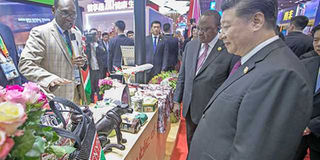Pan-Africanism the bridge to a shared future of civilisations

President Uhuru Kenyatta and his Chinese counterpart Xi Jinping during the opening of the inaugural China International Import Expo in Shanghai on November 5, 2018. In the 21st century, the ties of pan-Africanism are the bridge to a post-liberal world order re-imagined by the Chinese President Xi Jinping as “a community shared future for mankind.” PHOTO | FILE | PSCU
What you need to know:
- The Moroccans share the afro-optimism of an Africa rising now driving China’s expanding role on the continent.
- In linking with pan-Africanism, China is drawing inspiration from the 1955 Bandung Conference.
- Beijing is promoting dialogue on Pan-African and Confucian philosophies and people-to-people diplomacy involving scholars and thinkers.
In a speech delivered to the Organisation of African Unity (OAU) Summit in Cairo, Egypt, on July 19, 1964, Kwame Nkrumah noted, rather presciently: “The emancipation of Africa could be the emancipation of man.”
In the 21st century, the ties of pan-Africanism are the bridge to a post-liberal world order re-imagined by the Chinese President Xi Jinping as “a community shared future for mankind.”
After the 2017 electoral uncertainty, Pan-Africanism is a force in stabilising the State and securing the space for development in Kenya. In this regard, the African Union Commission has recently appointed Kenya’s Opposition leader, Raila Odinga, as its High Representative for Infrastructure Development in Africa.
Similarly, the Inter-Governmental Authority on Development (IGAD) appointed former Vice- President Kalonzo Musyoka to head the Joint Monitoring and Evaluation Commission (JMEC) on peace in South Sudan.
This week, I attended two conferences in Morocco, which drew my attention to the renewed efforts to use Pan-African ideology to promote dialogue and to underpin peaceful development in the emerging post-liberal international order.
One is the International Academic Symposium on: “Belt and Road Initiative and Building a Community of Shared Future for Mankind” co-hosted on November 13-16 2018 by Mohamed V University in Rabat and the International Confucian Association.
The other is the Pan-African Humanitarian Summit on “Africa, My Home: An Inclusive Participation for Africa’s Development” held in Rabat, Morocco, on 16-17, 2018.
DEFEAT COLONIALISM
As I arrived at Mohamed V International Airport in Morocco’s enchanted city of Casablanca for the meeting, fond memories of the formative years of pan-Africanism came to mind. Pan-Africanism had emerged from the Fifth Pan-African Congress in Manchester in October 1945 as a powerful force for Africa’s decolonisation. After independence, Casablanca was not only at the heart of the encounter between pan-Africanism and pan-Arabism, but became the “Mecca” of seven African states that shared a radical vision of the future of Africa led by left-wing leaders largely from North Africa (Algeria, Egypt, Libya) and West Africa (Ghana, Guinea and Mali).
In its meeting in 1961, the group called for unification to enable Africa to defeat colonialism, achieve peace, foster cultural dialogue, increase the continent's geopolitical influence and promote economic development.
POLITICAL FEDERATION
A moderate group that met in Monrovia, Liberia, on May 8—12, 1961 opposed the Casablanca Group’s “Africa Must Unite” thesis, instead arguing that Africa's independent states should co-operate and exist in harmony, but without political federation or deep integration.
In 1963, the Organisation of African Unity (OAU) was created as a compromise between the two extremes.
From 1975, the protracted conflict over Western Sahara posed the dilemma of reconciling the principle of self-determination and the quest for African unity. The United Nations officially considers Morocco and the Polisario Front as the main parties to the conflict. But in reality Morocco and Algeria are the “two chief protagonists”.
In 1976, the Polisario Front declared the establishment of “the Sahrawi Arab Democratic Republic”, which the United Nations declined to admit.
However, in 1984, the OAU recognised the independence of “the Sahrawi Arab Democratic Republic”. Angry and disillusioned by pan-Africanism, Morocco, rather unwittingly, exited the continental body.
It turned to an ideology Guy Martin theorises as “Eurafricanism” which stresses strengthening ties between Africa and the West.
In 1987, Morocco even applied to join the European Community (the precursor to the European Union). But its application was rejected on the grounds that Morocco was not a “European country”. In January 2017, Rabat rejoined the African Union, paving the way for peace-building.
The Moroccan King declared that “Africa is my home, and I am coming back home.” Western Sahara welcomed the move as a “positive step for the people of Western Sahara”.
Africa must now resolve the dispute, or haemorrhage within. For now, Morocco views Africa as a new frontier for growth. With an estimated population of 1,216,130,000 (2018), Africa is collectively the world's single largest market after China and India.
The Moroccans share the afro-optimism of an Africa rising now driving China’s expanding role on the continent.
The recent conference on President Xi’s Belt and Road Initiative highlighted China’s strategy of creating a new world order based on tolerance and alliance of peoples, cultures and civilisation.
BANDUNG CONFERENCE
In linking with pan-Africanism, China is drawing inspiration from the 1955 Bandung Conference, which opposed colonial or neo-colonial domination and sought to promote economic and cultural co-operation between the two regions representing a total population of 5.6 billion people.
Beijing is promoting dialogue on Pan-African and Confucian philosophies and people-to-people diplomacy involving scholars and thinkers to anchor its agenda of building what President Xi envisions as "a community of shared future for humanity" and to counter the divisive theories of "clash of civilisations", "Coming Anarchy" and "Thucydides Trap", which view war between cultures, peoples, powers and civilisations as inevitable.
As a rising superpower, China’s thinkers and policymakers have proposed the idea of “peaceful development” based on Beijing’s “Belt and Road Initiative” as an alternative pathway to building a prosperous, non-hegemonic and peaceful world as “a community of shared destiny for mankind.”
Prof Kagwanja is a former Government Adviser and currently Chief Executive of Africa Policy Institute (Kenya).





